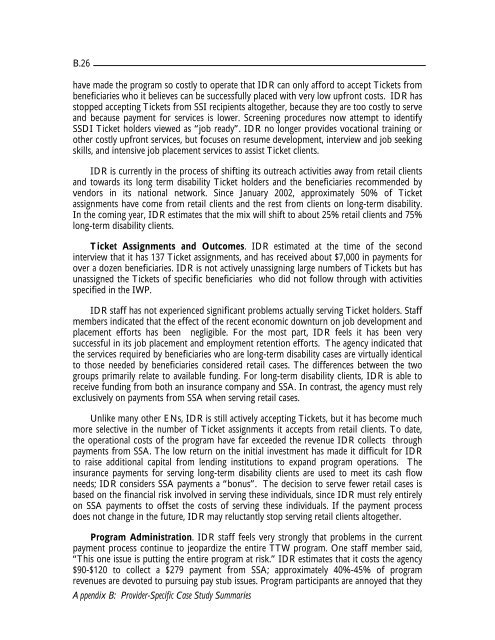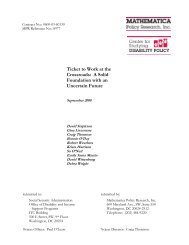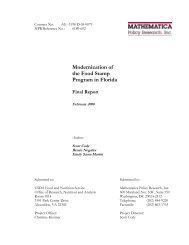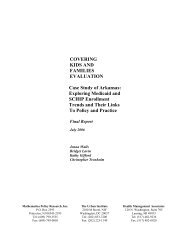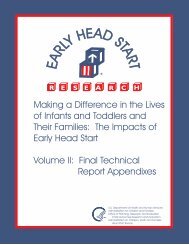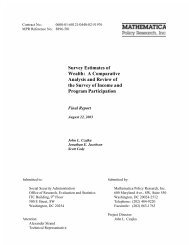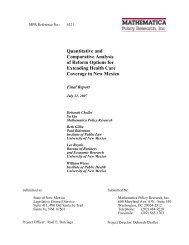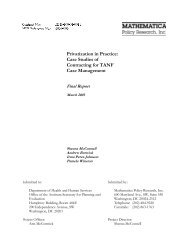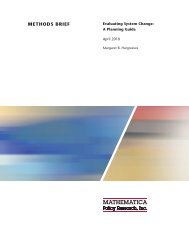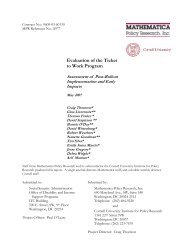Evaluation of the Ticket to Work Program Initial Evaluation Report
Evaluation of the Ticket to Work Program Initial Evaluation Report
Evaluation of the Ticket to Work Program Initial Evaluation Report
You also want an ePaper? Increase the reach of your titles
YUMPU automatically turns print PDFs into web optimized ePapers that Google loves.
B.26<br />
have made <strong>the</strong> program so costly <strong>to</strong> operate that IDR can only afford <strong>to</strong> accept <strong>Ticket</strong>s from<br />
beneficiaries who it believes can be successfully placed with very low upfront costs. IDR has<br />
s<strong>to</strong>pped accepting <strong>Ticket</strong>s from SSI recipients al<strong>to</strong>ge<strong>the</strong>r, because <strong>the</strong>y are <strong>to</strong>o costly <strong>to</strong> serve<br />
and because payment for services is lower. Screening procedures now attempt <strong>to</strong> identify<br />
SSDI <strong>Ticket</strong> holders viewed as “job ready”. IDR no longer provides vocational training or<br />
o<strong>the</strong>r costly upfront services, but focuses on resume development, interview and job seeking<br />
skills, and intensive job placement services <strong>to</strong> assist <strong>Ticket</strong> clients.<br />
IDR is currently in <strong>the</strong> process <strong>of</strong> shifting its outreach activities away from retail clients<br />
and <strong>to</strong>wards its long term disability <strong>Ticket</strong> holders and <strong>the</strong> beneficiaries recommended by<br />
vendors in its national network. Since January 2002, approximately 50% <strong>of</strong> <strong>Ticket</strong><br />
assignments have come from retail clients and <strong>the</strong> rest from clients on long-term disability.<br />
In <strong>the</strong> coming year, IDR estimates that <strong>the</strong> mix will shift <strong>to</strong> about 25% retail clients and 75%<br />
long-term disability clients.<br />
<strong>Ticket</strong> Assignments and Outcomes. IDR estimated at <strong>the</strong> time <strong>of</strong> <strong>the</strong> second<br />
interview that it has 137 <strong>Ticket</strong> assignments, and has received about $7,000 in payments for<br />
over a dozen beneficiaries. IDR is not actively unassigning large numbers <strong>of</strong> <strong>Ticket</strong>s but has<br />
unassigned <strong>the</strong> <strong>Ticket</strong>s <strong>of</strong> specific beneficiaries who did not follow through with activities<br />
specified in <strong>the</strong> IWP.<br />
IDR staff has not experienced significant problems actually serving <strong>Ticket</strong> holders. Staff<br />
members indicated that <strong>the</strong> effect <strong>of</strong> <strong>the</strong> recent economic downturn on job development and<br />
placement efforts has been negligible. For <strong>the</strong> most part, IDR feels it has been very<br />
successful in its job placement and employment retention efforts. The agency indicated that<br />
<strong>the</strong> services required by beneficiaries who are long-term disability cases are virtually identical<br />
<strong>to</strong> those needed by beneficiaries considered retail cases. The differences between <strong>the</strong> two<br />
groups primarily relate <strong>to</strong> available funding. For long-term disability clients, IDR is able <strong>to</strong><br />
receive funding from both an insurance company and SSA. In contrast, <strong>the</strong> agency must rely<br />
exclusively on payments from SSA when serving retail cases.<br />
Unlike many o<strong>the</strong>r ENs, IDR is still actively accepting <strong>Ticket</strong>s, but it has become much<br />
more selective in <strong>the</strong> number <strong>of</strong> <strong>Ticket</strong> assignments it accepts from retail clients. To date,<br />
<strong>the</strong> operational costs <strong>of</strong> <strong>the</strong> program have far exceeded <strong>the</strong> revenue IDR collects through<br />
payments from SSA. The low return on <strong>the</strong> initial investment has made it difficult for IDR<br />
<strong>to</strong> raise additional capital from lending institutions <strong>to</strong> expand program operations. The<br />
insurance payments for serving long-term disability clients are used <strong>to</strong> meet its cash flow<br />
needs; IDR considers SSA payments a “bonus”. The decision <strong>to</strong> serve fewer retail cases is<br />
based on <strong>the</strong> financial risk involved in serving <strong>the</strong>se individuals, since IDR must rely entirely<br />
on SSA payments <strong>to</strong> <strong>of</strong>fset <strong>the</strong> costs <strong>of</strong> serving <strong>the</strong>se individuals. If <strong>the</strong> payment process<br />
does not change in <strong>the</strong> future, IDR may reluctantly s<strong>to</strong>p serving retail clients al<strong>to</strong>ge<strong>the</strong>r.<br />
<strong>Program</strong> Administration. IDR staff feels very strongly that problems in <strong>the</strong> current<br />
payment process continue <strong>to</strong> jeopardize <strong>the</strong> entire TTW program. One staff member said,<br />
“This one issue is putting <strong>the</strong> entire program at risk.” IDR estimates that it costs <strong>the</strong> agency<br />
$90-$120 <strong>to</strong> collect a $279 payment from SSA; approximately 40%-45% <strong>of</strong> program<br />
revenues are devoted <strong>to</strong> pursuing pay stub issues. <strong>Program</strong> participants are annoyed that <strong>the</strong>y<br />
Appendix B: Provider-Specific Case Study Summaries


